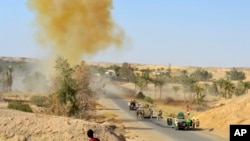Iraqi forces backed by the U.S-led coalition are increasing operations against a resurgent Islamic State (IS) in remote desert border areas, according to Iraqi and U.S. officials.
While much of the international attention is focused on large offensives to rout IS from Mosul in northern Iraq, and Raqqa, the IS de facto capital in Syria, IS activities in Iraq's Anbar province are now drawing additional attention from Iraqi and coalition forces.
Iraqi and tribal fighters joined this week to sweep and secure IS areas in and around Rutba, the major town on the road toward Jordan. The move came after several dozen Iraqi security forces were killed in IS ambushes in recent weeks.
"We have started this operation to reach the Iraqi-Syrian border," Iraqi Prime Minister Haider al-Abadi said this week. "And our second step, God willing, will be to control our border to prevent IS terrorists from moving freely."
Anbar offensive
The U.S.-led coalition, which has a major military installation known as Ayn al-Asad Airbase in the province, told VOA in a statement that the offensive in western Anbar would be challenging.
"This is an incredibly complex operating environment involving many partners and nations, especially those that share borders," the anti-IS coalition's Operation Inherent Resolve statement said.
With IS controlling much of the sprawling desert on the Syrian and Jordanian borders, experts say the fight against it will need time.
"We are at the start of a long journey," said Michael Knights, an Iraq expert at the Washington Institute for Near East Policy. "I do not think this offensive that has been announced is a two-month offensive or three-month offensive. It is a really long-term, multiyear initiative, and it is going to require significant international support."
Anbar, Iraqi's largest province, straddles much of the west and borders Saudi Arabia, Jordan and Syria, all the way to the gates of the capital, Baghdad. Despite its size, it is a sparsely populated, Sunni-majority region with people mostly settled near the Euphrates River.
Volatile province
Throughout history, various Iraqi governments had difficulty controlling the province. After the 2003 U.S.-led invasion, violence continued in Anbar, and more Americans died fighting insurgency groups there than in any other part of the country.
The province holds an appeal for IS, which declared a caliphate in 2014. It is not only a Sunni-majority province but also has key transportation routes to Jordan and Syria, a major oil pipeline, one of Iraq's most important dams, a number of Iraqi military bases and the American base.
"To control that region, there needs to be a large number of troops and advanced military infrastructure," Sarbaz Hama Amin, a Kurdish commander fighting IS in northern Iraq, told VOA. "But most importantly, you need the government from the other side of the border to control its territory."
The Syrian government lost control over most of its border with Iraq when civil war broke out in 2011, and Anbar province filled with extremist groups infiltrating from Syria.
"Anbar will naturally remain a haven for terrorist groups until Syria is able to control its borders," Amin said. "But there is not a single Syrian soldier on its border now, and it is unlikely there will be any for a while."
Amin said it is likely the U.S.-led coalition can help Iraqi forces with limited operations to reduce IS's ability to attack the big cities of Fallujah and Ramadi. But in the end, added Knights, Iraqi forces need full control of the province.
"It is a very important challenge because the Iraqis want to open the Amman-Baghdad highway and develop it as an economic corridor," he said. "There is no way you can have truckers from the gulf moving through ... if you have IS guys raiding down from the north into that highway system."




